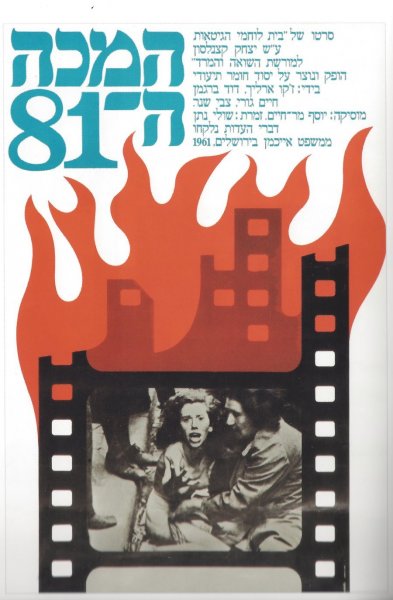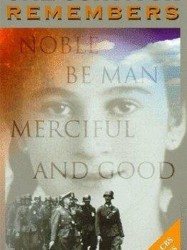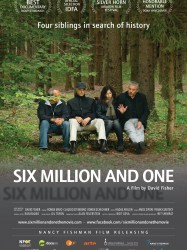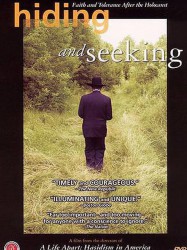Ha-Makah Hashmonim V'Echad est un film israelien de genre Documentaire
Ha-Makah Hashmonim V'Echad (1974)

Si vous aimez ce film, faites-le savoir !
- Infos
- Casting
- Infos techniques
- Photos
- Vidéos
- Passages TV
- Citations
- Personnages
- Musique
- Récompenses
Durée 1h55
OrigineIsrael
Genres Documentaire
Themes Le racisme, Religion, Documentaire sur la discrimination, Documentaire sur le droit, Documentaire sur la guerre, Documentaire historique, Documentaire sur une personnalité, Documentaire sur la religion, Politique, Religion juive, Documentaire sur la Seconde Guerre mondiale
Note75%










The 81st Blow (Hebrew: המכה ה-81 and also known as The Eighty-First Blow) is a 1974 Israeli documentary film directed by Haim Gouri. The film covers the oppression of Jews under the Nazis and features rare historical footage of concentration camps. It was nominated for an Academy Award for Documentary Feature. The title is derived from a comment by a witness at Adolf Eichmann's trial. According to his testimony, he was whipped 80 times by the Nazis, but was not believed by Israelis after the war; this final doubt of his own people was the "81st blow". The 81st Blow is the first film in the Israeli Holocaust Trilogy by Bergman, Ehrlich and Gouri. It was followed by The Last Sea (1980) and Flames in the Ashes (1985).
Commentaires
Postez un commentaire :
Suggestions de films similaires à Ha-Makah Hashmonim V'Echad
Il y a 8951 ayant les mêmes genres cinématographiques, 12785 films qui ont les mêmes thèmes (dont 60 films qui ont les mêmes 11 thèmes que Ha-Makah Hashmonim V'Echad), pour avoir au final 70 suggestions de films similaires.Si vous avez aimé Ha-Makah Hashmonim V'Echad, vous aimerez sûrement les films similaires suivants :

One Survivor Remembers (1996)
, 39minutesOrigine Etats-Unis
Genres Documentaire, Historique
Thèmes Le racisme, Religion, Documentaire sur la discrimination, Documentaire sur le droit, Documentaire sur la guerre, Documentaire historique, Documentaire sur une personnalité, Documentaire sur la religion, Politique, Religion juive, Documentaire sur la Seconde Guerre mondiale
Acteurs Peter Thomas
Note78%






Forget Us Not (2013)
Réalisé par Heather E. Connell
Origine Etats-Unis
Genres Documentaire
Thèmes Le racisme, Religion, Documentaire sur la discrimination, Documentaire sur le droit, Documentaire sur la guerre, Documentaire historique, Documentaire sur une personnalité, Documentaire sur la religion, Politique, Religion juive, Documentaire sur la Seconde Guerre mondiale
Acteurs Ron Perlman
Note72%





Forget Us Not is a look at the persecution and death of the 5 million non Jewish victims of the World War II Holocaust, and the lives of those who survived including:

Reshimat Ahava (2000)
, 1h30Genres Documentaire
Thèmes La famille, Le racisme, Religion, Documentaire sur la discrimination, Documentaire sur le droit, Documentaire sur la guerre, Documentaire historique, Documentaire sur une personnalité, Documentaire sur la religion, Politique, Religion juive, Documentaire sur la Seconde Guerre mondiale
Note69%





After the death of their parents, Filmmaker David Fisher feels that his family has grown apart and that his siblings are focused on their careers and relationships with their spouses and children. Fisher believes that a search for their sister, who was allegedly taken from their parents at birth, will help them bond.
 , 1h4
, 1h4Réalisé par Matej Mináč
Genres Documentaire, Historique
Thèmes Le racisme, Religion, Documentaire sur la discrimination, Documentaire sur le droit, Documentaire sur la guerre, Documentaire historique, Documentaire sur une personnalité, Documentaire sur la religion, Politique, Religion juive, Documentaire sur la Seconde Guerre mondiale
Acteurs Karel Reisz
Note81%





Partez à la rencontre de Nicholas Winton, véritable héros d'avant-guerre. Jamais considéré comme tel, cet homme a pourtant sauvé 669 enfants à la veille de la Seconde Guerre mondiale. Dans la capitale tchécoslovaque, alors qu´il se préparait pour des vacances au ski, le jeune Nicholas Winton va organiser une extraordinaire opération de sauvetage d'enfants juifs menacés par les nazis.

Six Million and One (2012)
, 1h33Genres Documentaire
Thèmes Le racisme, Religion, Documentaire sur la discrimination, Documentaire sur le droit, Documentaire sur la guerre, Documentaire historique, Documentaire sur une personnalité, Documentaire sur la religion, Politique, Religion juive, Documentaire sur la Seconde Guerre mondiale
Note66%





Joseph Fischer's memoir was discovered only after his death. His children refused to confront it, except for David, the filmmaker, for whom it became a compass for a long journey. When David found it unbearable to be alone in the wake of his father's survival story and in his struggle not to lose his sanity, he convinced his brothers and sister to join him in the hope that this would also contribute to releasing tensions and bring them as close as they used to be. His siblings, for their part, couldn’t understand why anyone should want to dig into the past instead of enjoying life in the present. The journey eventually leads the Fishers into the dark depths of the B8 Bergkristall tunnels, part of the Austrian KZ Gusen II concentration camp, where their father endured forced labor during the Holocaust. Illuminated only by flashlights, they seek meaning in their personal and family histories and undergo surgical and revealing discussions about family, survival and individualism only to come to the realization that they are unable to fully understand their father's past and the events that haunted him. Joseph Fischer's last couple of weeks at Gunskirchen concentration camp, were an inhuman experience that blocked his writing. In order to find out what his father failed to describe about Gunskirchen's liberation David located veterans of the 71st Infantry Division who liberated the camp. The elderly soldiers are still haunted and traumatized by the horrific sights they came across when entering the camp. Through their journey, the Fishers become emblematic of the entire second generation who are still grappling with the experience of their survivor parents.

Goodbye Holland (2004)
, 1h30Réalisé par Willy Lindwer
Genres Documentaire
Thèmes Le racisme, Religion, Documentaire sur la discrimination, Documentaire sur le droit, Documentaire sur la guerre, Documentaire historique, Documentaire sur une personnalité, Documentaire sur la religion, Politique, Religion juive, Documentaire sur la Seconde Guerre mondiale

Hiding and Seeking (2004)
Genres Documentaire
Thèmes Le racisme, Religion, Documentaire sur la discrimination, Documentaire sur le droit, Documentaire sur la guerre, Documentaire historique, Documentaire sur une personnalité, Documentaire sur la religion, Politique, Religion juive, Documentaire sur la Seconde Guerre mondiale
Note77%






Besa: The Promise (2012)
Réalisé par Rachel Goslins
Genres Documentaire
Thèmes Le racisme, Religion, Documentaire sur la discrimination, Documentaire sur le droit, Documentaire sur la guerre, Documentaire historique, Documentaire sur une personnalité, Documentaire sur la religion, Politique, Religion juive, Documentaire sur la Seconde Guerre mondiale
Note77%





 , 1h32
, 1h32Origine Etats-Unis
Genres Documentaire, Historique
Thèmes Film traitant du cinéma, Le racisme, Religion, Documentaire sur le monde des affaires, Documentaire sur le cinéma, Documentaire sur la discrimination, Documentaire sur le droit, Documentaire sur la guerre, Documentaire historique, Documentaire sur une personnalité, Documentaire sur la religion, Politique, Religion juive, Documentaire sur la Seconde Guerre mondiale, Documentaire sur les films
Acteurs Gene Hackman, Robert Clary, Dan Curtis, Ralph Edwards, Ralph Fiennes, Ben Kingsley
Note74%






They Were Not Silent (1997)
, 30minutesGenres Documentaire
Thèmes Le racisme, Religion, Le monde du travail, Documentaire sur la discrimination, Documentaire sur le droit, Documentaire sur la guerre, Documentaire historique, Documentaire sur une personnalité, Documentaire sur la politique, Documentaire sur la religion, Politique, Religion juive, Documentaire sur la Seconde Guerre mondiale
 Connexion
Connexion